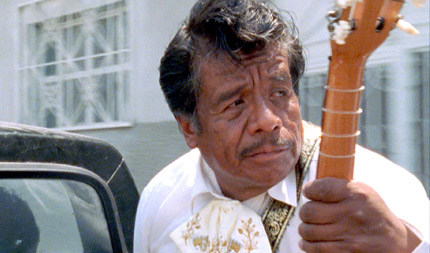|
Reviews of Recent Independent, Foreign, & Documentary Films in Theaters and DVD/Home Video
Directed, Produced, Photographed & Edited by: Mark Becker. Music by: Raz Mesinai. Language: Spanish with English subtitles. Released by: Kino International. Country of Origin: USA. 80 minutes. Not Rated. Documentary filmmaker Mark Becker introduces itinerant musician, guitarist, and singer Carmelo Muñiz Sánchez busking at restaurants and taquerías in San Francisco’s Mission District. The film follows Carmelo back to the cramped quarters he shares with other illegal immigrants from South America, as he frankly recalls the trials and tribulations of his longtime musical partnership with his friend Arturo Arias, who frequently succumbs to the pressures of their precarious life through alcohol. What sustains Carmelo is his family back home in Salvatierra, over a thousand miles south of the U.S. border, which he left in 1997 when he was 54 years old. He is proud the money he earns washing cars and serenading will help his two daughters with their school expenses, and will hopefully provide a nice quinceañera for his eldest. On a daily basis, Carmelo recalculates the money he can make singing lushly romantic ballads, for at best $50 a night, versus the yearning for his family (and they for him). The filming abruptly changes when Carmelo returns to Mexico to see his dying mother. Illustrating Carmelo’s monologue of how he was first smuggled into the United States, Becker traces that arduous route, graphically showing us just how difficult it would be to similarly return back. In addition to formal interviews with family and friends, Becker explores his native milieu and gives us more of a sense of Carmelo’s deep faith – he successfully sought out folk remedies for past depression and domestic strife. His sympathy for the prostitutes at the local bars, who encourage their clients to request his songs, is particularly touching, even as it spurs his anguish to support his daughters so they won’t have to resort to that choice. With the family’s financial resources considerably depleted by medical expenses and his lowered income, Carmelo again faces the choice of staying or leaving. Unfortunately, the ending does drag as he continues to grapple with indecision.
Unlike in 1999's Genghis Blues, about another older San Francisco guitarist and singer, there is very little discussion of
music, which consequently downplays Carmelo’s artistry and skill. He mentions in passing his parents’ musical interests, we see
photos of his younger days in mariachi bands, and he obviously lights up when tuning his guitar and playing just for himself. But
Becker is much more interested in focusing on the pushes and pulls of illegal immigration. While several films about Mexican
immigration have been on PBS and TV news magazines lately, this documentary personalizes the debate by showcasing an articulate and reflective individual in his own words and music.
Nora Lee Mandel
|

